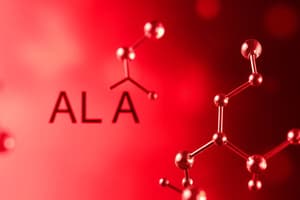Podcast
Questions and Answers
What is the general formula for alkanes?
What is the general formula for alkanes?
- CnHn
- CnHn+1
- CnH2n
- CnH2n+2 (correct)
What is the main difference between physical properties of alkanes and alkenes?
What is the main difference between physical properties of alkanes and alkenes?
- Alkanes are soluble in water and alkenes are insoluble
- Alkanes are polar and alkenes are non-polar
- Alkanes are insoluble in organic solvents and alkenes are soluble
- Alkanes are non-polar and non-reactive, while alkenes are polar and slightly reactive (correct)
What type of reaction do alkanes undergo with oxygen?
What type of reaction do alkanes undergo with oxygen?
- Addition reaction
- Electrophilic addition reaction
- Combustion reaction (correct)
- Substitution reaction
What is the suffix for alkenes in the IUPAC system?
What is the suffix for alkenes in the IUPAC system?
What is the main difference between the naming of alkanes and alkenes?
What is the main difference between the naming of alkanes and alkenes?
What is the main difference between the physical properties of alkanes and alkenes in terms of boiling points?
What is the main difference between the physical properties of alkanes and alkenes in terms of boiling points?
Flashcards are hidden until you start studying
Study Notes
Alkanes
- Definition: Saturated hydrocarbons with only single bonds between carbon atoms.
- General Formula: CnH2n+2
- Physical Properties:
- Non-polar and non-reactive
- Insoluble in water, soluble in organic solvents
- Boiling points increase with molecular weight
- Melting points increase with branching
- Chemical Properties:
- Undergo combustion reactions with oxygen
- Can undergo substitution reactions with halogens
- Can undergo oxidation reactions with oxygen or other oxidizing agents
- Naming:
- Use the IUPAC system
- Parent chain is the longest continuous chain
- Substituents are named as prefixes
- Alkane suffix is -ane
Alkenes
- Definition: Unsaturated hydrocarbons with at least one carbon-carbon double bond.
- General Formula: CnH2n
- Physical Properties:
- Polar and slightly reactive
- Insoluble in water, soluble in organic solvents
- Boiling points are lower than corresponding alkanes
- Melting points are generally lower than alkanes
- Chemical Properties:
- Undergo addition reactions with hydrogen, halogens, and other reagents
- Can undergo electrophilic addition reactions
- Can undergo oxidation reactions with oxygen or other oxidizing agents
- Naming:
- Use the IUPAC system
- Parent chain is the longest continuous chain containing the double bond
- Substituents are named as prefixes
- Alkene suffix is -ene
- Numbering starts from the end of the parent chain closest to the double bond
Alkanes
- Alkanes are saturated hydrocarbons with only single bonds between carbon atoms.
- The general formula for alkanes is CnH2n+2.
- Alkanes are non-polar and non-reactive, making them insoluble in water but soluble in organic solvents.
- The boiling points of alkanes increase with molecular weight.
- The melting points of alkanes increase with branching.
- Alkanes undergo combustion reactions with oxygen.
- Alkanes can undergo substitution reactions with halogens.
- Alkanes can undergo oxidation reactions with oxygen or other oxidizing agents.
- Alkane names are determined using the IUPAC system.
- The parent chain in an alkane is the longest continuous chain.
- Substituents in an alkane are named as prefixes.
- The suffix for an alkane is -ane.
Alkenes
- Alkenes are unsaturated hydrocarbons with at least one carbon-carbon double bond.
- The general formula for alkenes is CnH2n.
- Alkenes are polar and slightly reactive, making them insoluble in water but soluble in organic solvents.
- The boiling points of alkenes are lower than those of corresponding alkanes.
- The melting points of alkenes are generally lower than those of alkanes.
- Alkenes undergo addition reactions with hydrogen, halogens, and other reagents.
- Alkenes can undergo electrophilic addition reactions.
- Alkenes can undergo oxidation reactions with oxygen or other oxidizing agents.
- Alkene names are determined using the IUPAC system.
- The parent chain in an alkene is the longest continuous chain containing the double bond.
- Substituents in an alkene are named as prefixes.
- The suffix for an alkene is -ene.
- Numbering in an alkene starts from the end of the parent chain closest to the double bond.
Studying That Suits You
Use AI to generate personalized quizzes and flashcards to suit your learning preferences.




